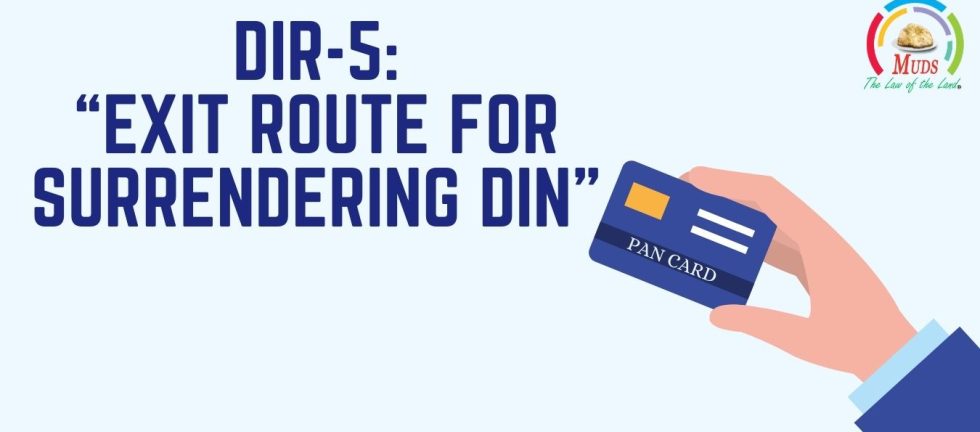DIR-5: “Exit Route for Surrendering DIN”
DIN is linked with the Permanent Account Number (PAN) or Passport of the applicant and so a person intending to become a director is allowed to obtain one DIN as per rules and regulations. By obtaining a single DIN, a person intending to become a director can become a director in multiple companies by that single DIN. Therefore prior to obtaining DIN or at any time making an application for allotment of DIN, the concerned person may verify the DIN database to check as to whether he has been allotted any DIN previously by the Central Government. The Central Government has also put in place a checking mechanism whereby prior to allotting any DIN, it also conducts a check and verifies the Data mentioned by the applicant with its database to avoid the issue of multiple DIN to an applicant. As a precautionary measure, it’s better for an applicant to verify from the MCA portal whether he has been allotted any DIN at any previous time.
How to Verify DIN – PAN Details of Directors
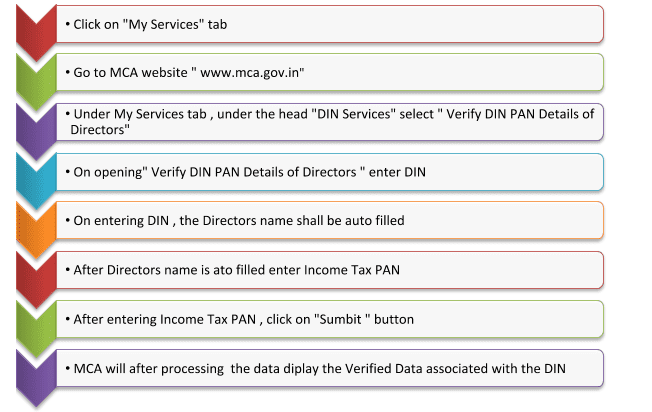
Once the verification exercise carried out by following the above steps, the image as to possession of DIN shall become clear and transparent. If end result of the verification exercise is positive i.e. no previous record of DIN allotted is found, the road to obtaining DIN is clear and less time-consuming. But if the end result is negative, which is a rare case, then is the start of an alarming time. Where the record of any previous DIN in possession of the applicant is found, then the current application shall be quashed off and no new DIN shall be allotted. If in the records more than one DIN are shown to be in possession of the applicant, then the applicant shall become the focal point of Central Government. The applicant would be ordered to surrender all DIN except one that are in his possession along with the reasons for holding the same and also pay the penalty for violation of the provisions of law.
What if Multiple DIN’s are in Possession
Possession of more than one DIN per director is considered a grave offense as per the provisions of Section 155 of The Companies Act, 2013. The director found to be in possession of multiple DIN’s shall not be bestowed relief and strict action would be taken against him by the Central Government. The director who is in possession of multiple DIN’s shall be issued a show-cause notice and would be ordered to surrender all the DIN’s that are in his possession except retaining one DIN with him. Also, the Central Government shall not grant any option or choice as to which DIN shall be retained. In case of multiple DIN’s the oldest DIN obtained shall only be retained and all other DIN’s would be required to be surrendered. Also, all companies associated with the DIN’s to be surrendered shall be mapped to the oldest DIN that is to be retained.
Recently, it was witnessed that Regional Director, Noida had issued show because notices to more than 2 lakh directors under section 266G of The Companies Act, 1956 ordering them to surrender back the multiple DIN’s that are in their possession. Also, many directors have not issued show-cause notices but were advised to voluntarily surrender the multiple DIN’s, if any in their possession.
“We at MUDS also suggest the directors who are in possession of multiple DIN’s to surrender the multiple DIN’s except one even though they have not received any show-cause notice for the same from Regional Director.”
Who is Required to Surrender DIN
‘Excess of anything is not fruitful and ultimately causes disadvantages’. Following this principle possession of more than one DIN is an alarming situation. The way out to escape is to surrender back all the multiple DIN and retain only one DIN, which is by law permissible.
Now having discussed the solution above, the surrender of DIN may flow through either of the two routes. The director falls under the first case, and then he will have to compulsorily surrender the multiple DIN’s whereas in the second case it is the self-call of the director to do so.
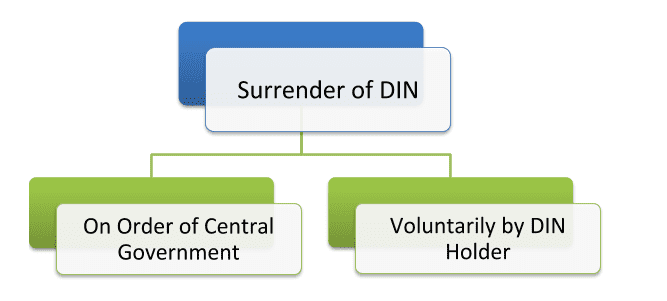
On Order of Central Government :
The Central Government may by order require any director in possession of DIN to compulsorily surrender DIN. The cases under which the central government may pass the order for the surrender of DIN are as follows:
- If duplicate DIN has been issued to the director;
- The allotted DIN was obtained By fraudulent means;
- On the death of concerned DIN holder;
- In the case where the DIN holder has been declared as a person of unsound mind by the Court and
- In the case where the DIN holder has been adjudicated insolvent by the Court.
Voluntarily by DIN Holder :
The DIN holder may voluntarily surrender his DIN suo motto. In such a situation he would be required to file e form DIR 5 attaching with it a declaration that he thought in possession of DIN has never been appointed as a director in any company and that the DIN which is being surrendered has never been used in making any communication to any regulatory authority. On verification by Central Government, the said DIN shall be deactivated. It is not always the scenario that DIN is to be surrender only if the order is received by the Central government but DIN for surrendering DIN, DIN can be surrendered voluntarily by the concerned DIN holder also. Under this route, the process is simple and less time-consuming as against surrendering DIN by Central Government order. The director surrendering the DIN would be required to specify the reason as to why he is surrendering the DIN.
Legal provisions concerning DIN surrender
For surrendering DIN, the director shall be required to comply with the provisions of the Companies Act, 2013 and Rule 11(f) of Companies (Appointment and Qualification of Directors) Rules, 2014.
Section 153: Application for Allotment of DIN
This section states that every individual who intends or wishes to be a director shall have to necessarily obtain DIN from the Central Government prior to becoming a director. The implication to be drawn from this section is that for becoming a director an individual should have DIN allotted to him by Central Government prior to becoming a director. The process for obtaining DIN shall be discussed at a later stage in this article. However vide an amendment made under The Companies Amendment Act, 2017 the Central Government has been assigned power to identify any other identification number to be used or considered as DIN.
Section 155: Prohibition to obtain more than one DIN
This section levies a prohibition on directors from obtaining multiple DIN’S. If an individual is a director in multiple companies then the concerned individual is not required to obtain separate DIN for each company but a single DIN obtained would be sufficient for becoming a director. That single DIN can be quoted for all companies where is or intends to be a director. If an individual obtains multiple DIN’S then in such a situation he would have to retain the oldest DIN obtained and surrender back all other DIN’S in his possession whether they were associated or not with any company, used or not. The companies associated with the surrendered DIN would be mapped to the oldest i.e. Retained DIN.
Section 159: Punishment for contravention
In cases where any individual or directors contravenes the provisions of Section 152, section 155 and section 156, then the concerned individual or director as the case may be shall be liable to the below-mentioned punishment :
I. Imprisonment: For a term which may extend to six months; or
II. Fine: which may extend up to Fifty thousand rupees.
Where the offenses under this section is a continuing one, then further fine which may extend up to five hundred rupees for every day during which such default continues shall be levied.
Rule 11(f)
The rule 11(f) of the Companies (Appointment and Qualification of Directors) Rules, 2014 states that on submission of an application to the Central Government in the prescribed form by the DIN holder annexing therewith a declaration stating that he has never been appointed as a director in any company and the said DIN(s) has not been used for filing any document with any regulatory authority, then on being satisfied the Central Government may deactivate such DIN.
Provided that prior to deactivating DIN, the Central Government shall verify the same with its record and after verification, it may according take any action in this regard.
Process of Surrendering DIN
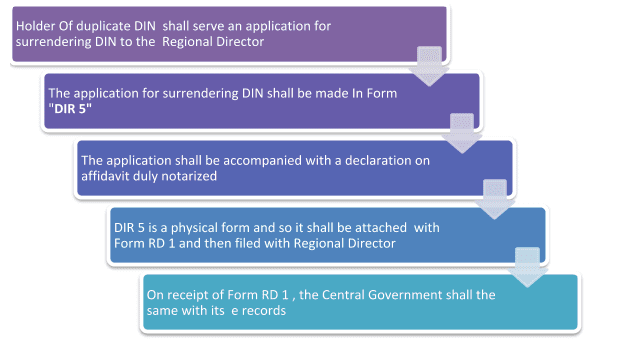
Procedure for Filing form DIR 5
Any DIN holder intending to surrender DIN may file Form DIR 5 for the same with MCA. While filing the said form the DIN holder shall mandatorily follow the prescribed procedure and provide the following information:
1. Name of the DIN holder: First, Last and Middle name
2. Father’s Name: First, Last and Middle name
3. Reason for surrendering DIN: Reason maybe anyone from below listed-
- Having Multiple DIN’s
- DIN was obtained in a wrongful manner or by fraudulent means
- Death of the concerned individual
- DIN holder is declared as a person of unsound mind by the competent court.
- Concerned Individual has been adjudicated as insolvent
- DIN holder is/was not associated with any company/LLP
4. Whether the DIN holder is retaining any DIN: if yes, in that case, the DIN holder shall provide the number of the oldest DIN which is being retained by him.
5. Number of DIN(s) being surrendered by the DIN holder: Along with the details of DIN number to be surrendered from which Name of DIN holder, Father’s name shall be auto-filled.
6. Contact details of DIN Holder: Contact number and Email id of DIN Holder
7. The digital signature of the DIN holder who is surrendering DIN
Attachments of Form DIR 5
The DIR 5 Form would be considered complete only after the attachment of two compulsory attachments. In the line of the above statement the below mention are the attachments to the form:
- Proof of Identity
The DIN holder may submit a Voter Identity card /Passport/Driving License/Aadhar card/PAN card as proof of identity.
- Proof of Residence
Address proof like Passport/ election card/Ration Card/Electricity Bill/Telephone Bill etc. may be submitted by the DIN holder as proof of residence.
Notes:
- In the case of Indian Applicants, the documents attached should not be older than two months as of the date of filing of the form.
- In the case of a Foreign Applicant, Address proof should not be older than one year as of the date of filing.
- If DIN is surrender on the grounds that the DIN holder is declared insolvent or a person of unsound mind, then in this situation the court order for the same shall also be annexed with the form.
- If DIN is surrender on account of the death of the DIN holder, then the death certificate issued for the DIN holder shall be annexed with the form.
- The proofs required to be attached with the form if are in any language other than English/Hindi then they shall be translated into English/Hindi from a professional translator.
The DIR 5 is a physical form and it is required to be annexed with e form RD 1. Through e form RD 1 an application is made to Regional Director for providing intimation and seeking approval for the surrender of DIN.
Approval of Regional Director: eform RD 1
For seeking approval of the Regional Director, an application is required to be made in e form RD 1. The eform RD 1 is required to be filed in pursuance to the provisions of the Companies Act, 2013. A company or its directors can make an application to Regional Director for carrying out purposes as mentioned under the Companies Act. Earlier e form 24A was required to file for the same purpose under the Companies Act, 1956.
Procedure for filing E Form RD 1
E form RD 1 is required for making and seeking approval of the Regional Director for undertaking any of the listed purposes in the Companies Act. While filing RD 1, the following data is required to be provided mandatorily:
- CIN No of the company in which the concerned person is a director; by the use of Oldest DIN
- The purpose of surrendering DIN
- Brief details of the application made through this form
- Digital signatures of the director filling form for surrendering DIN
The form RD 1 shall be filed with the regional director after attaching the required annexures. The list of annexures that shall form part of RD 1 are as follows:
- Scanned copy of physical DIR 5 form
- Self-attested copy of PAN card
- Self-attested copy of passport
- Affidavit of the surrender of DIN
- Board resolution for the surrender of DIN (if any)
Notes
- The E Form RD 1 shall be processed by the office of the Regional Director (NON-STP).
- The filing fees for RD 1 form shall be as follows:
| Application made | Other than OPC & Small Company | OPC & Small Company | |
|---|---|---|---|
| (i) | By a company having authorized share capital of : | ||
| Up to 25 Lakhs | 2000 | 1000 | |
| Above Rupees 25 Lakhs but up to 50 Lakhs | 5000 | 2500 | |
| Above Rupees 50 lakhs but up to Rupees 5 Crore | 10000 | N/A | |
| Above Rupees 5 Crore but up to 10 Crore | 15000 | N/A | |
| Above Rupees 10 Crore | 20000 | N/A | |
| (ii) | By a company limited by guarantee but not having a share capital | 2000 | N/A |
| (iii) | By a company having a valid license issued under section 8 of the Act(Section 8 company) | 2000 | N/A |
For calculating the amount of filing fee for RD 1, use the following link:
http://www.mca.gov.in/mcafoportal/enquireFeePreLogin.do
After the surrender of DIN, the concerned director should apply to National Company Law Board (NCLT) under section 441 of the Companies Act, 2013 for compounding of contravention of section 159 of The Companies Act 2013. Prior to commencement of the Companies Act, 2013 the directors had to apply to Company Law Board (CLB) under section 621A of the Companies Act, 1956 for compounding of contravention of section 266G of the Companies Act, 1956.
Who has the Power to compound the offense?
Any offense punishable under the Companies Act, 2013 whether committed by the company or any director thereof which is punishable with fine only, may be compounded either before or after the institution of proceedings by:
- The Tribunal; or
- Regional Director or any officer authorized by the Central Government, where the maximum amount of fine which may be imposed for any offense does not exceed five lakh rupees.
What is Compounding?
The Companies Act 1956 nor The Companies Act 2013 did not attempt to define the meaning of the term “Compounding of offense”.
We at MUDS drew the interpretation that “compounding is nothing but admission of guilt.”
In the process of compounding, the person may either suo moto or on receipt of notice of default or initiation of a prosecution, admit the commission of default and a make application for compounding of the said offense. As a result of compounding, the defaulter agrees to pay the penalty which may be ordered by the Central Government.
Important provisions in relation to compounding
The below listed are the important and crucial provisions related to compounding of offense.
- Any offense which is punishable under the Companies Act, 2013 with imprisonment or fine, or with imprisonment or fine or with both, shall be compoundable only with the permission of Special courts following the procedure as laid down in the act with respect to the compounding of offenses;
- Any offense which is punishable with imprisonment only or with imprisonment and also with fine shall not be compoundable under the Companies Act, 2013.
Process for Compounding
For getting the offense compounded, one needs to follow the below-mentioned procedure.
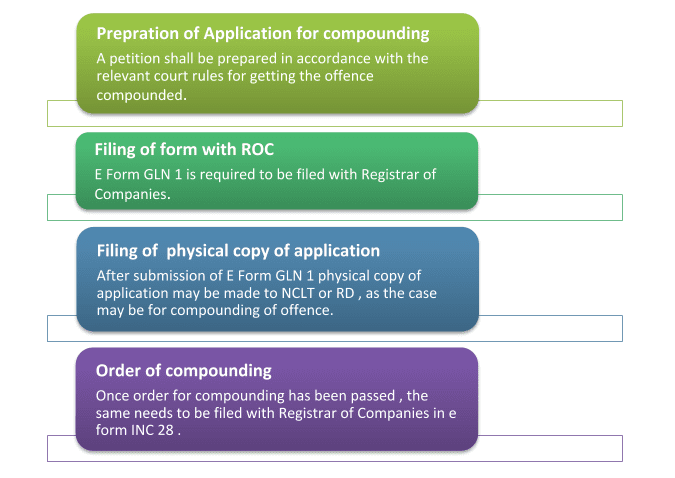
Effect of Compounding
The offense once compounded shall have the following effects:
Where the offense is compounded before institution of any prosecution, no prosecution shall be initiated either by the registrar or by any shareholder of the company or by any other person authorized by the Central Government, against the offender in relation to whom the offense is compounded.
Where the offense is compounded after initiation of a prosecution, such compounding shall be brought in writing by the registrar, to the notice of the court in which prosecution is pending. On giving notice of compounding of offense, the company or its officers in relation to whom the offense is so compounded shall stand discharged.
Where the offense is compounded either before or after the institution of prosecution, an intimation is required to be given by the company to the registrar within seven days from the date on which the offense is so compounded.
To sum up, the defaulting director needs to comply with the above-discussed requirement for surrendering his DIN. Once these compliances are strictly followed that to sequentially then the way out for surrendering DIN becomes easy and a quick process.
Hope this article was informative and helpful in resolving the queries relating to the surrender of DIN. Stay connected with MUDS for updates.


